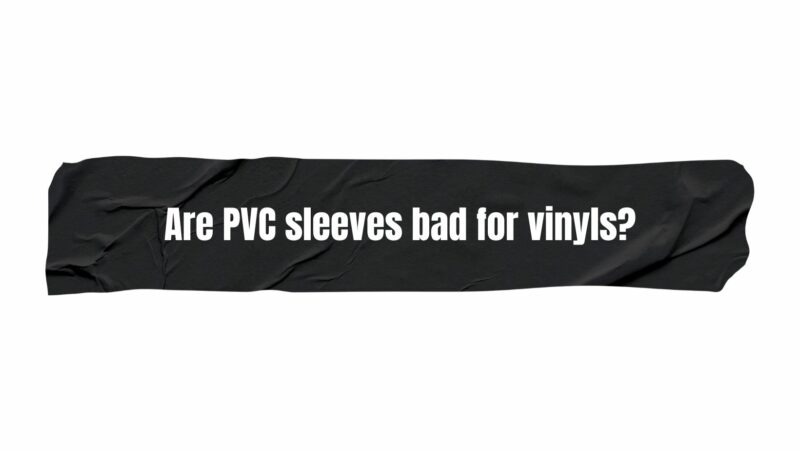The resurgence of vinyl records in recent years has rekindled a passion for analog music playback and the authentic experience it provides. Vinyl enthusiasts take great care in preserving the quality of their collections, and among the tools at their disposal are protective sleeves. However, a cloud of concern hangs over one type of sleeve material: polyvinyl chloride (PVC). In this article, we will delve into the debate surrounding PVC sleeves and their potential impact on vinyl records, exploring the history, drawbacks, and alternatives to better understand whether PVC sleeves are indeed bad for vinyl records.
The Genesis of PVC Sleeves
Polyvinyl chloride (PVC) is a synthetic plastic material that gained popularity due to its durability, flexibility, and affordability. It was initially introduced as a viable option for creating protective sleeves for vinyl records. These sleeves served the purpose of shielding records from dust, moisture, and physical abrasions, while also providing an affordable solution for record manufacturers and collectors.
The Drawbacks of PVC Sleeves
- Chemical Off-Gassing: One of the most significant concerns associated with PVC sleeves is the potential release of harmful gases over time. PVC is known to off-gas, releasing volatile organic compounds (VOCs) that can react with the vinyl records they are meant to protect. This chemical interaction can lead to discoloration, warping, and degradation of the vinyl over time.
- Acidification: PVC sleeves have been found to contribute to the acidification of the records they encase. The interaction between PVC and vinyl can cause the release of acidic byproducts, which further accelerate the breakdown of the vinyl and its grooves. Acidification results in a loss of sound quality and overall degradation of the record’s value.
- Adhesion: In some cases, PVC sleeves can stick to the vinyl records due to heat, pressure, or prolonged storage. This adhesion can cause irreparable damage to the record’s surface, often leading to the removal of the top layer of the vinyl or leaving behind residue that affects playback.
- Static Electricity: PVC sleeves are notorious for generating static electricity, which attracts dust and debris. This buildup of static can lead to an undesirable listening experience, with pops and crackles interrupting the playback.
Safe Alternatives to PVC Sleeves
- Polyethylene and Polypropylene: Two safer alternatives to PVC sleeves are polyethylene and polypropylene sleeves. These materials are chemically stable and do not release harmful gases or contribute to the acidification of vinyl records. They provide effective protection without the drawbacks associated with PVC.
- Paper and Cardboard Sleeves: Vintage paper and cardboard sleeves, while not as durable as plastic options, can be safe alternatives for short-term protection. They are less likely to interact negatively with vinyl records and are preferable for collectors concerned about long-term preservation.
- Anti-Static Treatments: Some manufacturers offer anti-static treatments for plastic sleeves, which can help mitigate the static electricity issue. While these treatments may not eliminate static entirely, they can reduce its impact on the vinyl.
Conclusion
The debate surrounding PVC sleeves and their impact on vinyl records is a complex one, rooted in both historical practices and evolving material science. While PVC sleeves were once widely used due to their affordability and convenience, their potential to release harmful gases, cause acidification, and lead to adhesion with vinyl records has raised significant concerns among collectors and enthusiasts.
As the vinyl community continues to grow, so does the emphasis on proper preservation techniques. For those seeking to protect their valuable collections and ensure the longevity of their vinyl records, alternatives such as polyethylene, polypropylene, and even vintage paper sleeves offer safer options. In the quest to preserve the authentic sound and aesthetic value of vinyl records, it is crucial to make informed decisions about protective sleeves, weighing the benefits of protection against the potential risks associated with PVC materials.


